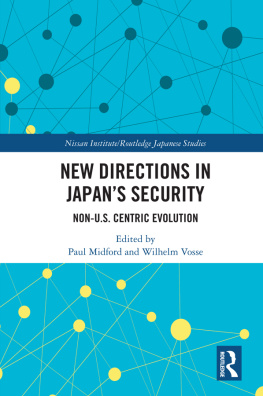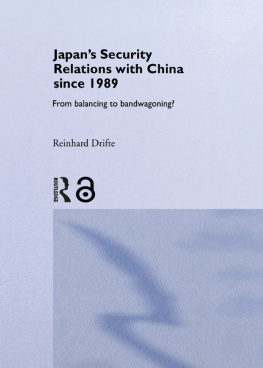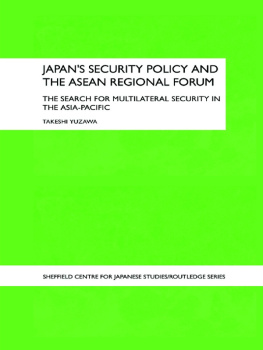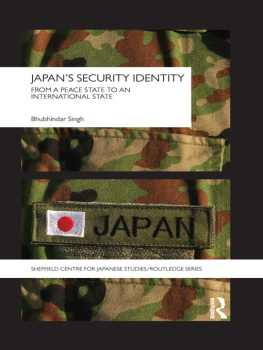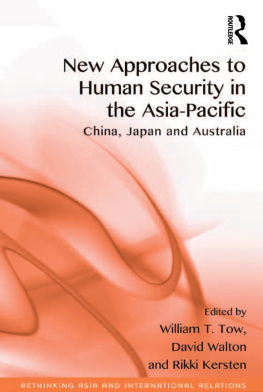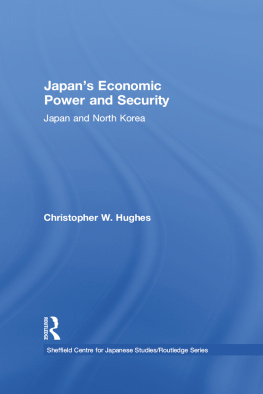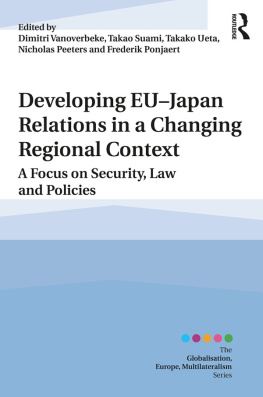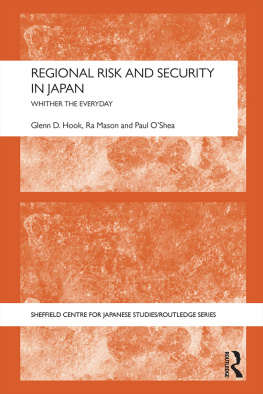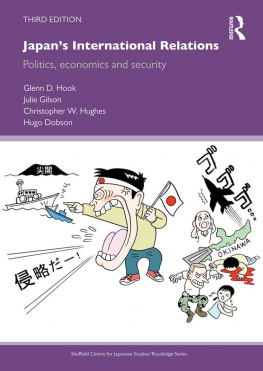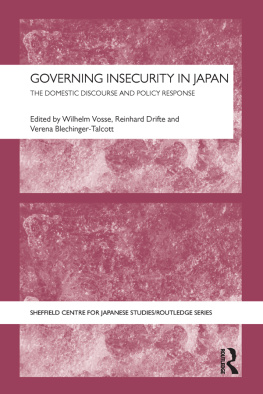New Directions in Japans Security
While the US-Japan alliance has strengthened since the end of the Cold War, Japan has, almost unnoticed, been building security ties with other partners, in the process reducing the centrality of the US in Japans security. This book explains why this is happening.
Japan pursued security isolationism during the Cold War, but the US was the exception. Japan hosted US bases and held joint military exercises even while shunning contacts with other militaries. Japan also made an exception to its weapons export ban to allow exports to the US. Yet, since the end of the Cold War, Japans security has undergone a quiet transformation, moving away from a singular focus on the US as its sole security partner. Tokyo has begun diversifying its security ties. This book traces and explains this diversification. The country has initiated security dialogues with Asian neighbors, assumed a leadership role in promoting regional multilateral security cooperation, and begun building bilateral security ties with a range of partners, from Australia and India to the European Union. Japan has even lifted its ban on weapons exports and co-development with non-US partners. This edited volume explores this trend of decreasing US centrality alongside the continued, and perhaps even growing, security (inter)dependence with the US.
New Directions in Japans Security is an essential resource for scholars focused on Japans national security. It will also interest on a wider basis those wishing to understand why Japan is developing non-American directions in its security strategy.
Paul Midford is Professor and Director of the Japan Program at the Norwegian University for Science and Technology (NTNU) in Trondheim.
Wilhelm Vosse is Professor of Political Science and International Relations at the International Christian University (ICU) in Tokyo, Japan.
Nissan Institute/Routledge Japanese Studies
Series Editors:
Roger Goodman
Nissan Professor of Modern Japanese Studies, University of Oxford, Fellow, St Antonys College
J.A.A. Stockwin
Formerly Nissan Professor of Modern Japanese Studies and former Director of the Nissan Institute of Japanese Studies, University of Oxford, Emeritus Fellow, St Antonys College
Japans World Power
Assessment, Outlook and Vision
Edited by Guibourg Delamotte
Friendship and Work Culture of Women Managers in Japan
Tokyo After Ten
Swee-Lin Ho
The Dilemma of Faith in Modern Japanese Literature
Metaphors of Christianity
Massimiliano Tomasi
Understanding Japanese Society
Fifth edition
Joy Hendry
Japan and the New Silk Road
Diplomacy, Development and Connectivity
Nikolay Murashkin
The Liberal Democratic Party of Japan
The Realities of Power
Nakakita Kji
Japans New Ruralities
Coping with Decline in the Periphery
Edited by Wolfram Manzenreiter, Ralph Ltzeler and Sebastian Polak-Rottmann
New Directions in Japans Security
Non-U.S. Centric Evolution
Edited by Paul Midford and Wilhelm Vosse
For more information about this series, please visit: www.routledge.com/Nissan-Institute-Routledge-Japanese-Studies/book-series/SE0022
New Directions in Japans Security
Non-U.S. Centric Evolution
Edited by Paul Midford and Wilhelm Vosse
First published 2021
by Routledge
2 Park Square, Milton Park, Abingdon, Oxon OX14 4RN
and by Routledge
52 Vanderbilt Avenue, New York, NY 10017
Routledge is an imprint of the Taylor & Francis Group, an informa business
2021 selection and editorial matter, Paul Midford and Wilhelm Vosse; individual chapters, the contributors
The right of Paul Midford and Wilhelm Vosse to be identified as the authors of the editorial material, and of the authors for their individual chapters, has been asserted in accordance with sections 77 and 78 of the Copyright, Designs and Patents Act 1988.
All rights reserved. No part of this book may be reprinted or reproduced or utilised in any form or by any electronic, mechanical, or other means, now known or hereafter invented, including photocopying and recording, or in any information storage or retrieval system, without permission in writing from the publishers.
Trademark notice: Product or corporate names may be trademarks or registered trademarks, and are used only for identification and explanation without intent to infringe.
British Library Cataloguing-in-Publication Data
A catalogue record for this book is available from the British Library
Library of Congress Cataloging-in-Publication Data
Names: Midford, Paul, editor. | Vosse, Wilhelm, editor.
Title: New Directions in Japans Security : Non-U.S. Centric Evolution / edited by Paul Midford and Wilhelm Vosse.
Description: London ; New York, NY : Routledge/Taylor & Francis Group, 2021. | Series: Nissan Institute/Routledge Japanese Studies | Includes bibliographical references and index.
Identifiers: LCCN 2020014805 (print) | LCCN 2020014806 (ebook) | ISBN 9780367416034 (hardback) | ISBN 9781003007623 (ebook)
Subjects: LCSH: National securityJapan. | Security, InternationalJapan. | JapanForeign relations.
Classification: LCC UA845 .N43 2021 (print) | LCC UA845 (ebook) | DDC 355/.033552dc23
LC record available at https://lccn.loc.gov/2020014805
LC ebook record available at https://lccn.loc.gov/2020014806
ISBN: 978-0-367-41603-4 (hbk)
ISBN: 978-1-003-00762-3 (ebk)
Typeset in Times New Roman
by Apex CoVantage, LLC
We dedicate this book to Miho and Ryoko.
Contents
Paul Midford and Wilhelm Vosse
Paul Midford
PART I
Non-American directions in defense policy
Bryce Wakefield
Christopher W. Hughes
PART II
Diversifying security partners
Thomas S. Wilkins
Natsuyo Ishibashi
Bjrn Elias Mikalsen Grnning
PART III
Japans focus on multilateral security cooperation
Takeshi Yuzawa
Wilhelm Vosse
Marie Sderberg
Yukiko Takezawa
PART IV
Reflections on Japans non-American focused initiatives
Andrew L. Oros
Suisheng Zhao
Wilhelm Vosse and Paul Midford
Guide
Editors
Paul Midford is Professor and Director of the Japan Program at the Norwegian University of Science and Technology (NTNU) in Trondheim. Midford received his PhD in Political Science from Columbia University in 2001 and has held visiting research positions at Chengchi, Doshisha, and Osaka Universities, the Japan Institute of International Affairs, the Research Institute for Peace and Security, and at Pomona College. He is author of Rethinking Japanese Public Opinion and Security: From Pacifism to Realism?; with Wilhelm Vosse, co-editor of Japans new security partnerships: Beyond the Security Alliance; and author of Overcoming Isolationism: Japans Leadership in East Asian Security Multilateralism.
Wilhelm Vosse is Professor of Political Science and International Relations at the International Christian University (ICU) in Tokyo, Japan, where he also served as Director of the Social Science Research Institute (SSRI). He held visiting research positions at the University of Oxford, Harvard University, and the University of Warwick. His research interests include Japanese foreign and security policy and the domestic discourse on defense and security. Current research projects deal with Japans new security partnerships, maritime piracy, and cybersecurity. Recent publications include

